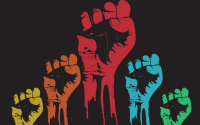Common Dreams / Published on Monday, September 26, 2005 by The Independent / UK
In a dusty schoolyard in Kano, northern Nigeria, a group of children are kicking a football. One of them, a solemn-faced boy called Anas, sits watching quietly. He cannot play because he has pains in his knees that prevent him from running.
Nobody knows what caused Anas' pain but suspicion has fallen on Big Pharma. Six years earlier, Anas was a patient in a trial of a new drug run by one of the world's biggest companies. A known side effect of the drug, called Trovan, was joint pain. The issues raised by Anas' story have become the subject of a major British film.
The multinational pharmaceutical industry is bracing itself for an uncomfortable autumn. Next month, The Constant Gardener, the film based on the novel of the same name by John Le Carré, opens in London.
Directed by Fernando Meirelles, of City of God fame, it is a thriller, a love story and a blistering attack on the drugs industry and the way it carelessly expends the lives of innocent citizens in the Third World in the quest for billion-dollar medicines to sell to the first world.
As with dramas of this kind - such as the 1999 film, The Insider, which detailed the perfidious dealings of the tobacco industry - it raises the question of how far fiction resembles fact. So it is worth examining the background to The Constant Gardener. The film opens in a remote area of northern Kenya where Tessa Quayle (played by Rachel Weisz), the wife of a British diplomat, has been murdered. Her travelling companion, a local doctor, has disappeared, and the evidence points to a crime of passion.
At the time of her death, Tessa, an activist and passionate campaigner, was on the verge of uncovering a conspiracy involving the testing of a new drug. In personality she was the opposite of her husband, the mild-mannered Justin Quayle (Ralph Fiennes), whose chief passion is his plants - he is the gardener of the title.
But in his grief, and goaded by whispers of her infidelity, he sets out to complete what she started, embarking on a quest to expose the truth about the pharmaceutical industry.
What he uncovers, as the film's blurb puts it, is "a vast conspiracy, at once deadly and commonplace, one that has claimed innocent lives - and is about to put his own at risk". At the centre of this conspiracy is the idea that pharmaceutical companies use African people to test drugs which are destined to become huge profit-earners in the West.
It is not the first time such allegations have been made, but they have rarely been levelled with such dramatic effect. Some will find The Constant Gardener's thesis overblown, but it is a gripping thriller, ravishingly shot by César Charlone, that conveys the chaos, grandeur and darkness of Africa with unequalled authenticity. After the credits roll, a note from John Le Carré appears on screen that reads: "Nobody in this story, and no outfit or corporation, thank God, is based upon an actual person or outfit in the real world. But I can tell you this; as my journey through the pharmaceutical jungle progressed, I came to realise that, by comparison with the reality, my story was as tame as a holiday postcard." This is hard to credit. The film features two brutal killings, a savage beating, a campaign of harassment, intimidation and threats involving two governments and their security services - all to protect the interests of a pharmaceutical company that is testing a drug on mothers and children and quietly burying its failures.
Maybe there are pharmaceutical companies that have engaged in such crimes and enlisted the support of corrupt governments. Who can say? But it is not necessary to posit such a gargantuan conspiracy, where paranoia is the only rational response. The crimes of the pharmaceutical industry - from the price protection of Aids drugs which have denied life-saving medicines to millions, to the cover up of lethal side effects to protect profits - are well documented.
But there are two cases in which named companies have been accused of wrongdoing that partly inspired The Constant Gardener and which give resonance to the allegations about the secret testing of drugs on the unsuspecting and the suppression of any negative findings.
In 1996, Kano was suffering from outbreaks of cholera and measles when a third, even more deadly, disease arrived: meningitis. The infection spread quickly through the cramped slums of the city and within weeks thousands of children were ill.
The outbreak was not reported in the West but it did not go unnoticed. An internet message alerted scientists at the research headquarters in Connecticut, of one of the world's biggest drug companies: Pfizer.
The company reacted swiftly. It chartered a plane to Kano with a new drug called Trovan that was a potential life-saver and a potential billion-dollar profit earner. But Trovan had never been tested on children.
The Infectious Diseases Hospital in Kano was under siege from desperate parents who brought their dying children begging for help. One of these was Anas, then aged six. His father, Mohammed, said his son was given a drug by "a doctor from overseas" and put to bed. Mohammed assumed the doctors who treated his son were from Médecins Sans Frontièrs, an independent medical organisation, who had arrived several weeks before the Pfizer team.
Only later when he examined a card he was given did he realise that Anas had been included in a trial of the new drug Trovan. The card was numbered 0001 - Anas was the first.






